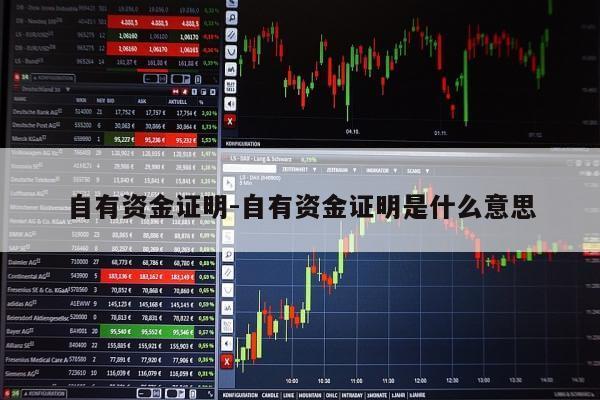自有资金证明-自有资金证明是什么意思
- 股市
- 2023-06-03
- 75

Self-Funding Proof: What Does It Mean?
As a seasoned investment expert, I have come across various financial terminologies which may seem confusing to the uninitiated. One of such is the Self-Funding Proof (SFP) which can be defined as documentation that shows an individual's capability to fund their investments without external support. In this article, we will explore what SFP is and how it affects investments in the stock market, forex market, mutual funds, securities and more.
1. Understanding Self-Funding Proof
Before delving into how SFP affects investments, it's necessary to understand its concept fully. As the name implies, SFP is proof that shows one has enough resources to fund their portfolio and not rely on external support. It is a vital component when entering investment deals or markets, especially for individuals who make significant transactions. A solid SFP guarantees lenders and investors' trust and confidence in the borrower's ability to repay loans and cover losses in an adverse situation.
A client once came to me with an excellent investment plan but lacked adequate self-funding. Without SFP, it would have been challenging to secure a lender's agreement and investor's trust in the portfolio. With my guidance, the client got necessary funding, backed by a robust SFP. The portfolio thrived, and the investor reaped the rewards.
2. Its Impact on Stock and Forex Markets
The stock market and forex market are two investment options that are known for their widely fluctuating prices and volatility. Investors who rely heavily on lending and external support without any SFP are at higher risk of failing when the market experiences a recession. With a solid SFP, investors and traders can confidently invest in the stock and forex markets. It reduces the risk of incurring losses as they have a fallback resource for recovering their investments. In the stock market especially, companies that have a robust SFP are regarded as financially stable and have a better chance of attracting investors.
For instance, in late 2020, Amazon reported a record-breaking $10 billion in SFP, increasing its shareholders' confidence and attracting more investors. Today, Amazon ranks among the top multinational companies.
3. Impact on Mutual Funds, Securities, and other Investment Plans
Investors who fund their portfolios with external loans take considerable risks. A situation where they find it challenging to repay debt could lead to a default, which will reflect negatively on their credit reports and affect their long-term financial goals. In contrast, self-funding investors with a robust SFP enjoy higher confidence from lenders and investors. The quality of SFP determines the investment limits an individual may access.
Similarly, it affects mutual funds, securities, and other investment plans such as ETFs, trusts, and more. Institutions typically require clients to have a robust SFP before offering them investment opportunities. An individual's SFP shows they have adequate resources to cover their investment and can mitigate the risk of losses even in an adverse market condition.
Conclusion
Investing can be challenging, but even more challenging when you don't have a sound self-funding proof. This article has highlighted what an SFP is, how it affects investments in markets such as stocks, forex, securities, and mutual funds. It's essential to note that having a robust SFP guarantees trust, increases investors' confidence, mitigates loss, and can open up vast investment opportunities. As an investment expert, my advice is to build a solid SFP and avoid relying solely on external support for your investment decisions.























